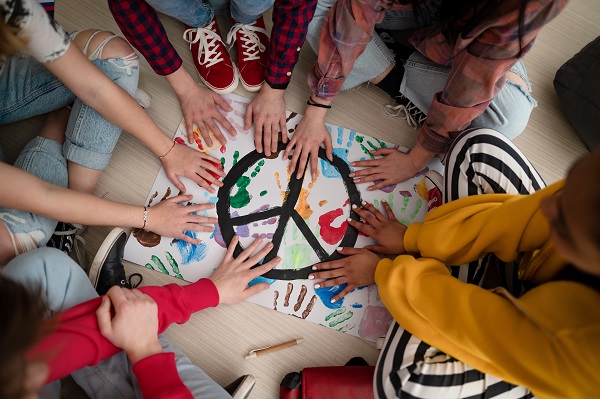Europe needs peace education – peace education needs Europe

Peace education as a European effort
The war in Ukraine highlights the need for the systematic promotion of peace education in European schools. In order to cope with the current and ongoing horrors and consequences of war, young people need help: help to be able to deal with the accompanying, often polarising debate that will inevitably be conducted in their various countries. Young people are also exposed to social media, or they may hear personal accounts and impressions of what happens during wars. This is why guidance and direction are needed from the adults they know, whether these are parents or teachers. It is especially important that schools offer young refugees a safe, respectful environment.
Young people are entitled to a climate in which they can safely express their ideas on how they want to live together in the future. Every day provides an opportunity for schools to teach peace (respect, appreciation and tolerance). These tenets can be imparted; it is also important to ensure that they are put into practice.
Peer Mediation is a constructive way of resolving a disagreement in the classroom. During lessons it is possible to address questions relating to the causes of violence and war, which can include discussions addressing the violent past of one's own country. In Germany, this would encompass the period of National Socialism, for instance. Peace itself can be made a topic: young people enjoy engaging with role models advocating peace. This may be through the biographies of people who have either campaigned in the past and/or those who continue to promote peace today.
It would be desirable for schools to be able to enter a discussion, at European level, on the way peace education is promoted. The Erasmus+ project, ‘Schools joining up for Communities of Peace’ (SchoolCoPe) has paved the way.
In focus: digital peace education
Peace education in general makes use of procedures and activities based on scientific findings and draws on years of practical experience. Learning processes that promote peace are often part of our everyday life; however, they are particularly pertinent throughout all areas of formal education. Schools and colleges have always played an excellent role in peace education. Related to the context of the region, peace education is both necessary and possible in all phases of a conflict.
Today peace education through digital means is gaining ground. This has less to do with the traditional competence in using media (whether digital devices can be usefully deployed). It is about a peace-oriented, critical ability to use media – including ways in which digital methods can contribute to the aims of peace education. In digital realms too, people encounter violence and conflict. Often such altercations can escalate more easily there, spilling over into the analogue world. Disinformation spreads like wildfire; deep fakes make it harder and harder to establish what is fact and what is fiction. For this reason, it is more essential than ever to make people aware of such phenomena, so that they can take a stand on hate speech, disinformation and conspiracy theories.
Digital peace education is not limited to the teaching of a critical view when engaging with media. Rather it aims to encourage people to perceive the digital space as a positive one: in other words, to embrace it (see for example the projects #vrschwrng and Culture of conflict 3.0). How can a desire for change, and the courage to change develop online? Because a digital civil society requires both: critical media literacy and efforts by individuals to create a more peaceful online network.
Additional information
-
Education type:School Education
-
Target audience:Head Teacher / PrincipalNot-for-profit / NGO staffParent / GuardianStudent TeacherTeacherTeacher Educator
